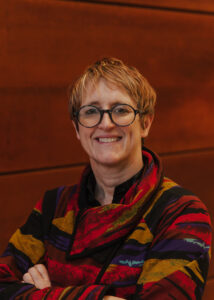
Order her latest book: How Journalists Engage: A Theory of Trust Building, Identities, and Care (Oxford University Press, 2023)
Sue Robinson joined the UW-Madison faculty at the School of Journalism and Mass Communication in January 2007 and now holds the Helen Firstbrook Franklin Professor of Journalism endowed research chair. Working in the realm of “Journalism Studies,” she explores how journalists and news organizations can build trust by rethinking traditional news production norms and routines and instead adopting “engagement” practices.
As a scholar, she practices what is called “applied research,” which means she works with journalists and newsroom trainers to incorporate her evidence-based findings and then helps evaluate and learn from those interventions. She is currently at work on a new multi-phased book project, tentatively titled, “Journalism Disruption: Interventions in Newsrooms to Rebuild Trust with Audiences” with co-researcher Dr. Joshua Darr of Syracuse University and her collaborators include journalism programs Trusting News, Spaceship Media, Solutions Journalism Network, and Hearken.
Her 2023 book is titled How Journalists Engage: A Theory of Trust Building, Identities, and Care (Oxford University Press) and explores how journalists enact trusting relationships with their audiences. Drawing from case studies, community-work, interviews, and focus groups, she documents a growing built environment around trust building and engagement journalism that represents the first major paradigm shift of the press’s core values in more than a century. She demonstrates how this movement mobilizes the nurturing of personal, organizational, and institutional relationships that people have with information, sources, news brands, journalists, and each other. Developing a new theory of trust building, Robinson calls for journalists to grapple actively with their own and their audiences’ group dynamics by utilizing an ethic of care.
Both her 2021 book (with Matt Carlson of University of Minnesota and Seth Lewis of University of Oregon titled News After Trump: Journalism’s Crisis of Relevance in a Changed Media Culture) and her 2018 multi-method book called Networked News, Racial Divides: How Power & Privilege Shape Public Discourse in Progressive Communities (Cambridge University Press) won awards and were well received within the profession.
Informing all of her work is her role as Publisher of the School’s hyperlocal news site Madison Commons and the Journalism Educator Collaborative – a network of reporting instructors rethinking Journalism School curriculum in the United States that she founded in 2020.
Her “journalism-studies” interests include:
- Community-based journalism
- Civic engagement & public deliberation (in mediated spaces)
- Applied research
- Media ecology
- Capacities in information flows and exchange
- Collective memory in media
- Digital technologies
- Networks (particularly as examined through a qualitative lens)
- News narratives
- Her methods (generally a qualitative, cultural studies perspective) include:
- Ethnography (newsrooms, community observation)
- In-depth interviews
- Focus Groups
- Textual analyses
- Network Analysis, Network Ethnography
Her past work includes a comprehensive, multi-year newsroom ethnography and corresponding in-depth audience study that led to a recently published monograph in Journalism and Communication Monographs as well as numerous articles and book chapters. Her work has been published in Journal of Communication, Journalism & Mass Communication Quarterly, New Media & Society, Mass Communication & Society, Journalism, Journalism Studies, Journalism Practice and Convergence, among others. She has been a Klein-Carnell Distinguished Fellow (at Temple University) and a Missouri Distinguished Visiting Professor (University of Missouri) as well as a William T. Evjue Faculty Fellow, a Vilas Fellow and an H.I. Romnes Fellow (at UW-Madison). In addition, she received the Maier Faculty Development Endowment Award and the AEJMC Krieghbaum Under-40 Award.
Robinson teaches journalism studies, qualitative methods, news reporting, social media, literary journalism, and other classes at both the graduate and undergraduate level.
She is a consultant for a number of news organizations and has had collaborations with the the Agora Journalism Center, Journalism That Matters, the Aspen Institute, the Kettering Foundation and the Minority Student Achievement Network. She also volunteers and works closely with local nonprofits, both as a community member in Madison, a faculty member engaged in Community-Based Learning Courses, and the publisher of Madison Commons.
A former business, technology, agriculture and seafood writer for a dozen years, Robinson earned her B.A. in journalism from the University of New Hampshire in 1994, her M.A. in journalism from Northeastern University in 2000, and her Ph.D in mass media and communication from Temple University in 2007.